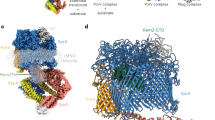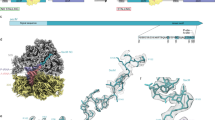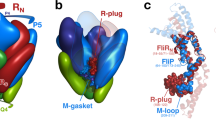Abstract
Recent studies in a eukaryotic system indicate that a block in secretion can lead to a block in the translation of secretory proteins1. This feedback on protein synthesis is thought to be a result of an interaction of the signal recognition particle with the signal sequences of nascent proteins. Genetic studies in the prokaryote Escherichia coli suggest that a complex secretion machinery2–6 and a similar feedback mechanism7 exist. In addition, mutations affecting two genes, secA and secC, thought to encode components of the bacterial secretion machinery, selectively interfere with the synthesis of exported proteins. This selective interference with translation may be a result of recognition by the secretion machinery of signal sequences. If so, alteration of the signal sequence of a particular protein by mutation should eliminate the block in synthesis for that protein. We show here that signal sequence mutants for an exported protein, maltose binding protein, prevent the block in synthesis of this protein in a secA mutant.
This is a preview of subscription content, access via your institution
Access options
Subscribe to this journal
Receive 51 print issues and online access
$199.00 per year
only $3.90 per issue
Buy this article
- Purchase on Springer Link
- Instant access to full article PDF
Prices may be subject to local taxes which are calculated during checkout
Similar content being viewed by others
References
Walter, P. & Blobel, G. J. Cell Biol. 91, 557–561 (1981).
Emr, S. D., Hanley-Way, S. & Silhavy, T. J. Cell 23, 79–88 (1981).
Oliver, D. B. & Beckwith, J. Cell 30, 311–319 (1982).
Kumamoto, C. & Beckwith, J. J. Bact. 154, 253–260 (1983).
Oliver, D. et al. UCLA Symp. molec. cell. Biol., New Ser. 8, 371–383 (1983).
Ito, K. et al. Cell 32, 789–797 (1983).
Hall, M. & Schwartz, M. Annls Microbiol. Inst. Pasteur, Paris 133 A, 112–117 (1982).
Kellerman, D. & Szmelcman, S. Eur. J. Biochem. 47, 139–149 (1974).
Bassford, P. & Beckwith, J. Nature 277, 538–541 (1979).
Bedouelle, H. et al. Nature 285, 78–81 (1980).
Debarbouille, M., Shuman, H. A., Silhavy, T. J. & Schwartz, M. H. J. molec. Biol. 114, 59–371 (1978).
Ito, K., Bassford, P. J. & Beckwith, J. Cell 24, 707–717 (1981).
Oliver, D. B. & Beckwith, J. Cell 25, 765–772 (1981).
Chamberlain, J. P. Analyt. Biochem. 98, 132–135 (1979).
Author information
Authors and Affiliations
Rights and permissions
About this article
Cite this article
Kumamoto, C., Oliver, D. & Beckwith, J. Signal sequence mutations disrupt feedback between secretion of an exported protein and its synthesis in E. coli. Nature 308, 863–864 (1984). https://doi.org/10.1038/308863a0
Received:
Accepted:
Issue Date:
DOI: https://doi.org/10.1038/308863a0
This article is cited by
-
Ribo-attenuators: novel elements for reliable and modular riboswitch engineering
Scientific Reports (2017)
-
Mechanism of protonophores-mediated induction of heat-shock response in Escherichia coli
BMC Microbiology (2009)
-
Why does ethanol induce cellular heat-shock response?
Cell Biology and Toxicology (2006)
-
SecA protein: Autoregulated initiator of secretory precursor protein translocation across theE. coli plasma membrane
Journal of Bioenergetics and Biomembranes (1990)
-
Secretion of Mature IFN–α2 and Accumulation of Uncleaved Precursor by Bacillus subtilis Transformed with a Hybrid α–Amylase Signal Sequence–IFN–α2 Gene
Nature Biotechnology (1986)
Comments
By submitting a comment you agree to abide by our Terms and Community Guidelines. If you find something abusive or that does not comply with our terms or guidelines please flag it as inappropriate.



